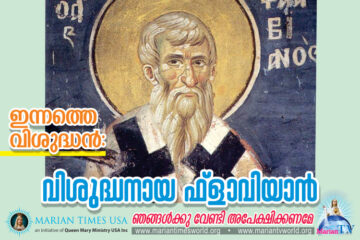THE SPIRIT OF GOD IS UPON ME! (SUNDAY HOMILY)


~ Fr. Abraham Mutholath ~
Chicago, USA. ~
HOMILY – FIRST SUNDAY OF EPIPHANY
Jesus is the Liberator
Bible Text (Luke 4:16-22a)
(16) He came to Nazareth, where he had grown up, and went according to his custom into the synagogue on the sabbath day. He stood up to read (17) and was handed a scroll of the prophet Isaiah. He unrolled the scroll and found the passage where it was written: (18) “The Spirit of the Lord is upon me,because he has anointed me to bring glad tidings to the poor.He has sent me to proclaim liberty to captives and recovery of sight to the blind, to let the oppressed go free, (19) and to proclaim a year acceptable to the Lord.” (20) Rolling up the scroll, he handed it back to the attendant and sat down, and the eyes of all in the synagogue looked intently at him. (21) He said to them, “Today this scripture passage is fulfilled in your hearing.”(22) And all spoke highly of him and were amazed at the gracious words that came from his mouth.
Interpretation
(16) He came to Nazareth, where he had grown up, and went according to his custom into the synagogue on the sabbath day. He stood up to read
Nazareth
During the ministry of Jesus, Nazareth was a small, hilly and fertile village 12 miles southwest of the Sea of Galilee. Though Hellenistic (Greek) culture was widespread in Galilee at that time, this village remained conservative keeping all Jewish traditions and values.People spoke Aramaic language that was a later version of Hebrew, but with many words and phrases that were borrowed from Babylonian and other languages and cultures. This might be because of 70 years of Babylonian exile of the Jews. Jesus spoke this Aramaiclanguage.
Nazareth, where he had grown up
Jesus lived in Nazarethwith his parents for around27 years. Selection of Nazareth which was not at all popular and not mentioned in the Old Testament was another sign of humility of Jesus. When Philip introduced Jesus of Nazareth to Nathaniel, he asked Philip, “Can anything good come from Nazareth?” (John 1:46). The only good that came out of Nazareth was that Jesus was known as Jesus of Nazareth or the Nazarene. The inscription that Pilate placed on the cross of Jesus read: “Jesus the Nazorean, the King of the Jews.”
He came to Nazareth
Before coming to his hometown Nazareth, Jesus preached for a year in Galilee that included Nazareth. But he did not enter there because he knew that he would be rejected by his own countrymen.Instead, he moved to Capernaum and returned later in the synagogue of Nazareth where he wasrejected,and the outraged people tried to kill him by throwing him off a hill(Luke 4:29).
Went according to his custom into the synagogue on the sabbath day
Jesus used to attend synagogue service on a regular basis even when he had disagreements with some of their practices. His parents made sure that every Jewish practice was followed in Jesus’ life. They circumcised Jesus on the eighth day (Luke 2:21) and presented Jesus in the temple (Luke 2:22-40). When St. Luke, the Evangelist presents the event of finding the missed child Jesus in the temple at the age of 12, he starts saying: “Each year his parents went to Jerusalem for the feast of Passover.” (Luke 2:41).
(17) and was handed a scroll of the prophet Isaiah. He unrolled the scroll and found the passage where it was written:
Prophet Isaiah
The book of Isaiah is famous for its prophecy on Messiah. It includes the announcement of his coming (Isaiah 40:3–5), his virgin birth (7:14), his proclamation of the good news (61:1-3), his sacrificial death (52:13–53:12), and his return to claim His own (60:2–3). That is why Jesus read from the Book of Isaiah either by God’s providence or because the synagogue attendant wanted to know how Jesus would interpret the prophesies of Isaiah. Jesus was already known as Messiah in Capernaum before the reading of this passage in Nazareth.
Isaiah prophesied during the reign of Judean kings Uzziah, Jotham, Ahaz, and Hezekiah (Isaiah 1:1) and probably died under the evil King Manasseh. Isaiah must have lived in Jerusalem (Isaiah 1:1). He prophesied from 739–681 BC to the southern kingdom of Judea that turned away from God. The northern kingdom of Israel had been carried into captivity (722 B.C.) by the Assyrians. The kingdom of Judah was in spiritual turmoil because of idolatry and evil. They were in threat from Assyrians and the uprising Babylonians.
According to Prophet Isaiah, the pagan nations and their captivity wereinstruments of God to discipline his people Israel for their sins. However, Isaiah gave people hope that the promised Messiah would come to establish the golden age of peace and prosperity. The literal meaning of Isaiah is “Yahweh saves.” His name and message are the same and his name was the same as of Joshua and Jesus who were also instruments of God’s saving power.
He unrolled the scroll
During Jesus’s time, the books were scrolls rolled around a cylinder from the beginning to the end. Therefore, Jesus had to unroll it to read.
(18) “The Spirit of the Lord is upon me, because he has anointed me to bring glad tidings to the poor. He has sent me to proclaim liberty to captives and recovery of sight to the blind, to let the oppressed go free,
The Spirit of the Lord is upon me
Jesus received the Holy Spirit in the form of a dove immediately after his baptism (Luke 3:22). Later he sent the same Spirit of the Lord on the apostles on the day of Pentecost to continue the same mission he started in this world (Acts 2:1-4). We also receive the same spirit of God at the time of our baptism and the sacraments that follow.
Because he has anointed me
Prophets were considered as God’s anointed ones. Jesus is depicted here as a prophet like Elijah and Elisha. Messiah means the anointed. At the time of his baptism, the Holy Spirit anointed Jesus and that was why Jesus had the title Messiah. As Christians, we also share in the prophetic role of Jesus because we are also anointed at the time of baptism and confirmation (chrismation).
To bring glad tidings to the poor / afflicted
Compared to other Evangelists, Luke gives importance to Jesus’ approach for the welfare of the economically and socially poor. Afflicted is the term used in the Book of Isaiah instead of poor. Jesus said: “Blessed are you who are poor, for the kingdom of God is yours.” (Luke 6:20). The poor accepted the message of Jesus and got enriched by him. The Pharisees and Scribes despised the lowliness and poverty of Jesus. So, those proud people could not receive the glad tidings of Jesus; whereas those they hated and made poor received him with joy.
The afflicted included the gentiles who had no knowledge of the true God, the law and the prophets. The public sinners among the Jews, the economically poor, the depressed, the sick were all considered afflicted. Jesus touched or healed them all.
To bind up the broken hearted
In Isaiah 61:1 we read, “to bind up the broken hearted.” Jesus was anointed to rebuild the broken hearted. People were depressed because of their sin, because they were overburdened in the name of the laws of Moses, or because of their ignorance of the mercy of God. Adam was broken hearted when he was sent out from the presence of God, the Garden of Eden. Jesus came down to the children of Adam to heal their broken heartedness. Jesus physically broke his heart to mend our broken heart.
Recovery of sight to the blind
Jesus gave sight to all the physically blind who approached him for help. However, his main mission was to recover the sight of those who were spiritually blinded because of their ignoranceor misunderstanding of God. The Jewish leaders of his time were blind leading the blind (Mathew 15:14).
To let the oppressed, go free
This prophesy of freedom from oppression was not political like freedom from foreign rulers but from the bondage of Satan and sin. Jesus physically and spiritually liberated many from the possession of demons and sickness caused by the bondage of Satan. His ultimate mission was to strike the head of the serpent (Genesis 3:15) who caused the fall of mankindand who continue to make them fall away from God.
(19) and to proclaim a year acceptable to the Lord.
Jesus had declared the Year of the Jubilee when all that were lost were restored. At the Jubilee Year, all Israelites who became slaves were set free, and all land that had been sold returned to its original owners. So those who sold themselves as slaves or those who lost their land for loan could get them back unconditionally. Regaining of freedom, prosperity, and joy were the results of Jubilee celebration for the afflicted. A Jubilee Year started with the coming of Jesus who officially proclaimed a Year of Mercy from God.
The day of vengeance of our God
In Isaiah 61:2 the prophet continued saying, “to proclaim the year of the LORD’s favor and the day of vengeance of our God, to comfort all who mourn.” Jesus purposefully avoided reading the second part of verse 61:2 because the day of the vengeance of the Lord was not happening at that time. It will happen only at the second coming of Christ.
(20) Rolling up the scroll, he handed it back to the attendant and sat down, and the eyes of all in the synagogue looked intently at him.
All people in the synagogue looked attentively on Jesus because they were wondering how Jesus was going to comment on the verses he read. They knew that the passage he read was on the prophecy of Messiah. Jesus was already famous in Capernaum and the listeners in the synagogue had heard about it. They wanted to hear Jesus declaring his Messiahship direct from him because they had known Jesus from his childhood onwards.
(21) He said to them, “Today this scripture passage is fulfilled in your hearing.”
Instead of directly saying that he was the Messiah, Jesus implied that in this saying. The long-awaited prophesy of Isaiah was fulfilled at that time through the ministry of Jesus. So far Jesus was performing what was prophesied about him. He made his official declaration of Messiahship in the synagogue of his hometown.
(22) And all spoke highly of him and were amazed at the gracious words that came from his mouth.
People were astonished at the way Jesus spoke and the graciousness of his speech. They had never heard him speaking with such conviction and openness.
Message:
- Joseph and Mary were practicing Jews who took Jesus regularly to the synagogue. Jesus continued that practice when he became adult. We need to train our children to practice religion so that it becomes habitual for them.
- Jesus practiced what he preached. Even before the announcement of his mission statement prophesied by Isaiah, Jesus began to practice that at Capernaum. Let us practice what we believe and teach.
- Jesus came as a liberator of the afflicted. We, who follow Jesus, are also called to care for the afflicted in the society. The final judgement will be based on how we imitate Jesus in taking care of them.
- John the Baptist, like prophets of the past, was a preacher of doom. However, Jesus’ message was uplifting, optimistic, and affectionate. We should follow the style of Jesus in serving others.
- If we are afflicted for any reason, Jesus is our physician. The Satan continues to lead and keep us in bondages like bad habits, rejection of God, materialism, or selfishness. Jesus can set us free from our spiritual or moral deviations.
മരിയന് ടൈംസിലെ ഇന്നത്തെ പ്രധാനപ്പെട്ട അപ്ഡേറ്റുകള് താഴെ ലഭിക്കുന്നതാണ്.









